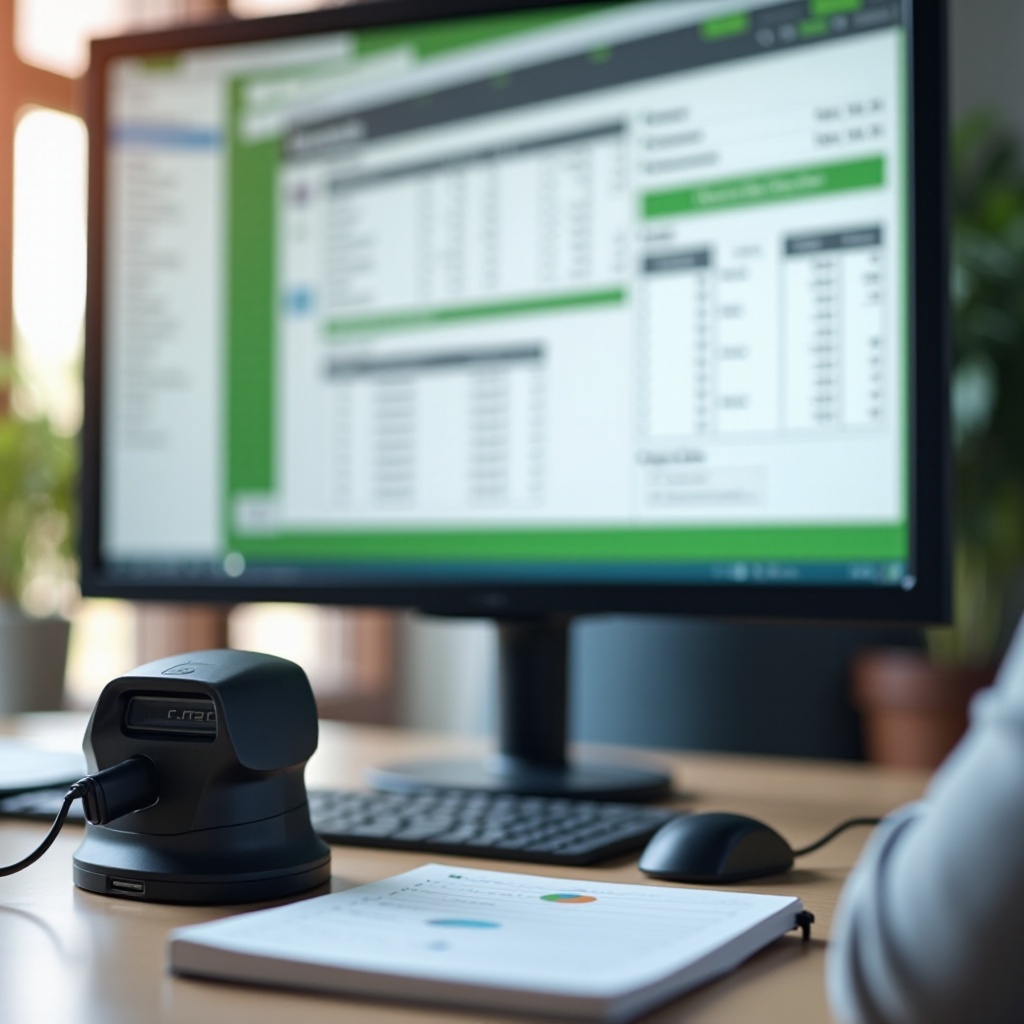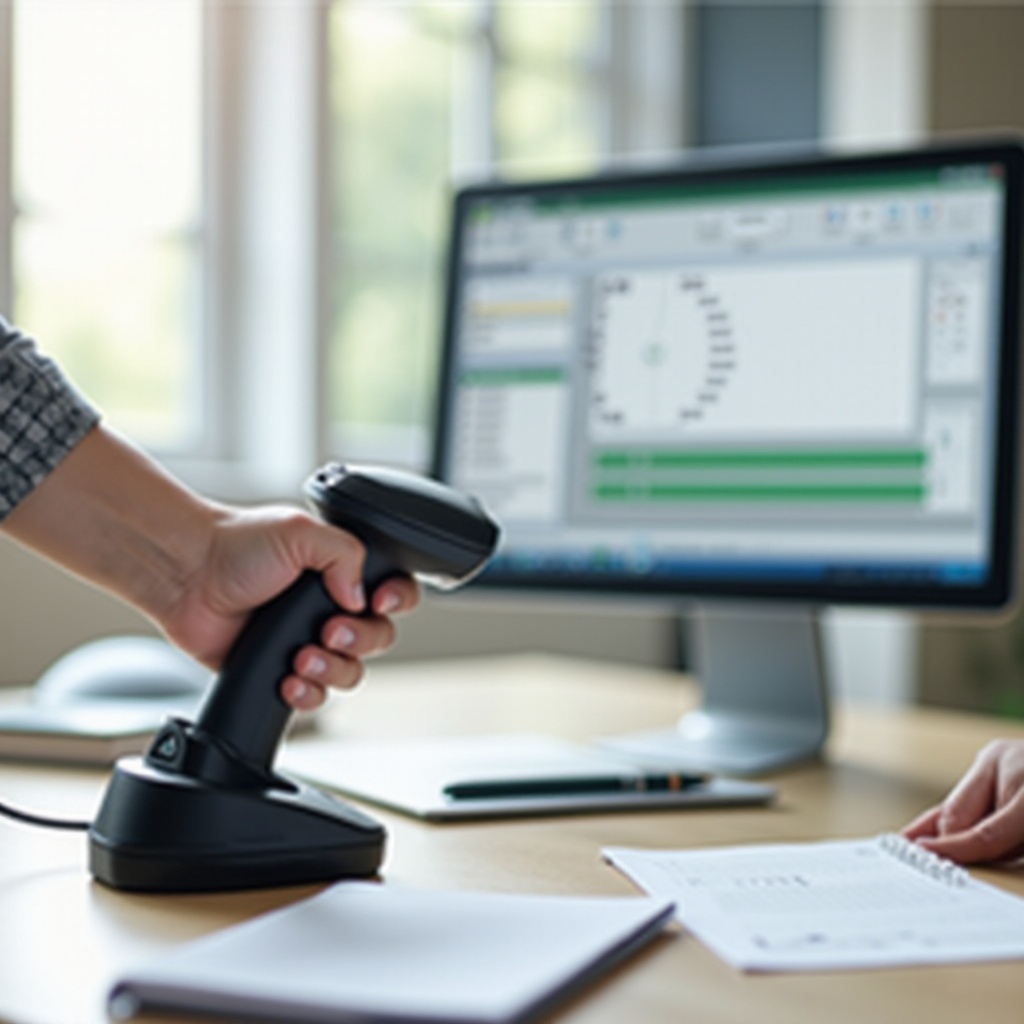Introduction
Integrating barcode scanners with QuickBooks can revolutionize your business operations, offering precision and efficiency in inventory management and sales transactions. This comprehensive guide delves into the significance, benefits, and top choices of barcode scanners compatible with QuickBooks. By the end of this article, you’ll understand how to seamlessly integrate these devices into your business processes and maintain them effectively.

Understanding Barcode Scanners and Their Importance
Barcode scanners are handheld or stationary devices that capture and read information contained in barcodes. The scanner uses a light source to illuminate the barcode and sensors to capture the reflected light, converting the barcode into a digital signal that is processed and decoded.
These devices are critical in modern business settings, enhancing speed and accuracy in sales, inventory management, and various other operations. They minimize human errors, ensuring that data input is accurate and reliable. For businesses that require robust record-keeping, like retail or warehousing, barcode scanners are indispensable.
Moving forward, we’ll explore why combining barcode scanners with QuickBooks is a game-changer for businesses.
Why Use Barcode Scanners with QuickBooks
QuickBooks is widely known for its comprehensive accounting and inventory management capabilities. When paired with barcode scanners, it streamlines operations, simplifying the tracking of stock levels, sales, and purchases.
- Efficiency and Accuracy: Barcode scanners significantly reduce manual entry errors. They ensure that every time a product is scanned, the exact details are recorded in QuickBooks almost instantly.
- Time-Saving: There’s a substantial reduction in the time spent on administrative tasks. Automating inventory updates and sales tracking allows employees to focus more on other critical areas of operations.
- Seamless Integration: Most barcode scanners can easily integrate with QuickBooks, promoting a seamless data flow which helps in generating accurate financial and inventory reports.
Having understood the synergy between barcode scanners and QuickBooks, let’s delve into the key features to look for when choosing a barcode scanner compatible with QuickBooks.

Features to Look for in Barcode Scanners for QuickBooks
When selecting a barcode scanner for QuickBooks, several features ensure optimal performance and seamless integration.
- Compatibility: Ensure the barcode scanner is compatible with QuickBooks. Check if it supports QuickBooks POS or any other specific version you are using.
- Ease of Use: Look for scanners that are user-friendly. Handheld scanners typically offer greater mobility, whereas stationary scanners can be quicker for high-volume tasks.
- Connectivity: Scanners with USB connectivity are generally a safe bet, but wireless options offer greater flexibility, especially in large warehouse settings.
- Durability and Battery Life: For businesses with extensive scanning needs, investing in a durable barcode scanner with a long-lasting battery life is crucial.
- Scanning Range and Speed: Ensure the scanner can read barcodes quickly and from a reasonable distance. High-speed scanners reduce wait times, improving customer satisfaction.
Armed with these insights, we proceed to evaluate the top barcode scanners that fit well with QuickBooks.

Top Barcode Scanners Compatible with QuickBooks
Honeywell Xenon 1900
The Honeywell Xenon 1900 stands out with its robust imaging technology that reads virtually all barcodes. It offers:
- Exceptional motion tolerance
- Reliable scanning accuracy
- Ergonomic design for comfortable use
Ideal for diverse scanning needs, its powerful engine ensures swift scanning, making inventory management straightforward.
Zebra DS2208
Known for its durability and ease of use, the Zebra DS2208 is a favorite among businesses. Key features include:
- Plug-and-play capabilities
- Scanning of both 1D and 2D barcodes
- Comprehensive warranty
This scanner combines efficiency with ruggedness, making it suitable for heavy-duty use in various environments.
NADAMOO Wireless Barcode Scanner
The NADAMOO Wireless Barcode Scanner is notable for its wireless functionality, making it highly flexible. It features:
- Long transmission distance
- Stores data when out of range
- User-friendly setup and operation
Suitable for both small businesses and large warehouses, its affordability and functionality make it an excellent choice.
Now that we have covered the top scanners, it’s crucial to understand how to integrate these devices with QuickBooks.
How to Set Up Your Barcode Scanner with QuickBooks
Setting up a barcode scanner with QuickBooks involves several steps to ensure smooth operation. Here’s a guide:
- Install Drivers: Most barcode scanners come with a driver CD or downloadable software. Install these on the computer connected to QuickBooks.
- Connect Scanner: Using USB or another connection method, connect your barcode scanner to the computer.
- QuickBooks Configuration:
- Open QuickBooks and navigate to the inventory management section.
- Go to ‘Preferences’ and select ‘Barcode Scanner Setup’.
- Follow the on-screen prompts to add the scanner.
- Testing: Scan a product barcode to check if the information is captured accurately.
Proper setup is crucial for reaping the full benefits of barcode scanners in sync with QuickBooks. Equally important is the maintenance of these scanners to ensure longevity and uninterrupted service.
Best Practices for Maintaining Your Barcode Scanner
Maintaining your barcode scanner maximizes its lifespan and ensures consistent performance. Here are some best practices:
- Regular Cleaning: Dust and debris can impair scanning. Clean the scanner lens and exterior regularly.
- Proper Storage: Store in a dry, secure place. Avoid exposure to extreme temperatures or humidity.
- Firmware Updates: Regularly update the scanner’s firmware for improved functionality and bug fixes.
- Handle with Care: Avoid dropping or subjecting the scanner to physical shocks. Use protective cases if necessary.
A well-maintained scanner provides reliable service, ensuring your QuickBooks operations remain smooth.
Conclusion
Integrating barcode scanners with QuickBooks enhances business efficiency, reduces errors, and streamlines inventory management. By selecting a compatible and reliable barcode scanner, and maintaining it properly, businesses can leverage the full potential of QuickBooks. The Honeywell Xenon 1900, Zebra DS2208, and NADAMOO Wireless are excellent choices that cater to various needs and budgets.
Frequently Asked Questions
What are the main benefits of using a barcode scanner with QuickBooks?
Using a barcode scanner with QuickBooks improves accuracy, reduces manual data entry errors, saves time on administrative tasks, and provides real-time inventory tracking.
How do I troubleshoot common issues with barcode scanners and QuickBooks?
Common issues include connectivity problems, unresponsive scanners, and incorrect data entries. Ensure that the scanner drivers are updated, check connections, and recalibrate the scanner settings in QuickBooks.
Can I use any barcode scanner with QuickBooks, or are specific models required?
Not all barcode scanners are universally compatible with QuickBooks. It’s best to choose scanners known for their compatibility with QuickBooks and to check the specifications provided by the scanner manufacturer.

